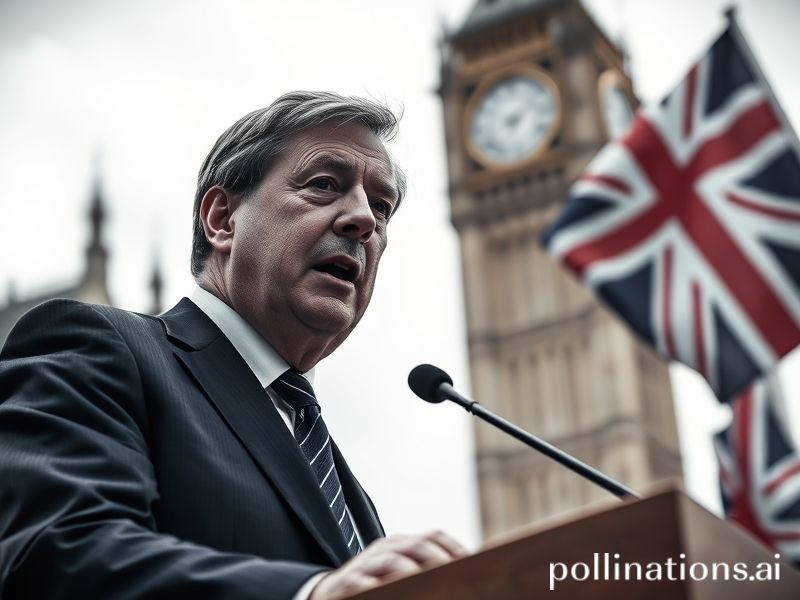Richard Tice: Exporting Brexit Blues to a Bewildered World
Richard Tice is what happens when a property-developer-turned-politician discovers that Brexit is not, in fact, a temporary mood swing by the British electorate but a durable export commodity. From the glass towers of London’s Canary Wharf to the fluorescent glare of European Parliament committee rooms in Strasbourg, Tice has become the living embodiment of a nation negotiating with itself in public—loudly, expensively, and with all the grace of a hedge fund at last call.
Born in 1964 during the twilight of empire and the dawn of package holidays, Tice studied geophysics, a discipline devoted to locating buried treasure and subterranean fault lines—skills that now serve him uncannily well in politics. After co-founding the property group Quidnet (motto: “Because ‘Leverage’ Was Too Subtle”), he pivoted to co-chairing Leave Means Leave, a campaign whose name carries the same reassuring tautology as “Cash Only ATM.” When that crusade culminated in the 2016 referendum, Tice’s reward was a ringside seat to watch the pound perform interpretive dance and diplomatic protocol be rewritten by people who previously thought “WTO rules” was a pub quiz category.
Undeterred by the small matter of reality, Tice and his ally Nigel Farage launched the Brexit Party in 2019—essentially a start-up whose product line was cathartic yelling. The venture secured 29 European Parliament seats, allowing Tice to collect EU parliamentary allowances while denouncing the EU’s very existence, a contradiction so pure it could power a small fusion reactor of hypocrisy. From Strasbourg to Brussels, officials greeted him with the weary cordiality normally reserved for the office photocopier that occasionally bursts into flames yet still somehow functions.
Tice’s global significance, if we may abuse that word, lies in how deftly he has franchised British political neuroses for international consumption. Populists in Rome, Warsaw, and Washington have studied his talking points the way earlier generations studied the Beatles: take the melody of grievance, add a local accent, and watch the stadium fill. When he warns that “globalists” are scheming to erase national identities, foreign audiences hear the same lullaby, just with subtitles. The irony, of course, is that the same capital markets that enriched him are the ones he now accuses of cosmopolitan treachery—a twist so Shakespearian that even the Globe Theatre gift shop has run out of suitably tragic fridge magnets.
Meanwhile, the rest of the planet observes Britain’s ongoing self-sequestration with the polite horror of neighbors watching someone wallpaper over the smoke alarm. Supply-chain managers in Rotterdam, currency traders in Singapore, and Scottish salmon farmers alike now treat Tice’s pronouncements as a kind of weather report: not necessarily accurate, but useful for deciding whether to bring an umbrella or a flak jacket to work. The WTO’s appellate body—when it has enough judges to form a quorum—quietly files each new UK negotiating demand next to the folder marked “Unicorns: Breeding Manual.”
In 2022, Tice became leader of Reform UK, a rebrand about as convincing as calling a hangover “Next-Day Optimism.” The party’s platform blends libertarian tax dreams with nationalist border fantasies, a cocktail that goes down smoothly in think-tank PowerPoints but tends to separate into curdled layers when exposed to daylight. Polls suggest the electorate remains skeptical, though Britons have been known to vote for stranger things—some of them twice.
What the world learns, then, from the Richard Tice Experience™ is that late-stage capitalism produces a surplus of ideology the way breweries produce foam: inevitable, mildly intoxicating, and requiring careful disposal. Every country has its Tice—some with better hair, most with worse property portfolios—proving that the market for elegant simplifications is never bearish for long. As long as there are trade figures to misread and foreigners to blame, someone will be there to sell the ticket. The rest of us just hope the ride ends before the gift shop runs out of souvenir sick bags.







